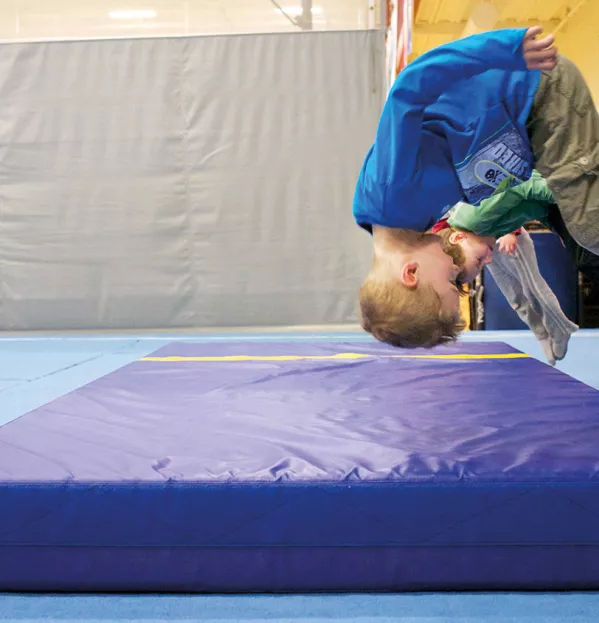Error 404: web access not found

One of the biggest priorities for those working in education at the moment - as well as the government - is to ensure that schools expand all pupils’ opportunities.
A question asked of most new teaching interventions, therefore, is whether they will narrow or widen the attainment gap that exists between pupils from different backgrounds.
When it comes to flipped learning, commentators are split on whether it will reduce educational inequality or end up reinforcing it.
According to the Education Endowment Foundation’s (EEF) findings on one flipped learning intervention, MathsFlip, pupils eligible for free school meals experienced greater progress using the approach than their more advantaged peers. However, there are caveats to this.
Steve Payne, headteacher at the Halesowen Church of England Primary School in Dudley, says being entrusted with a laptop gave many of his pupils from deprived backgrounds a genuine sense of pride, which positively impacted their education.
And Jennifer Devaney, primary maths and assessment lead at Shireland Collegiate Academy in the West Midlands, argues that flipped learning has the potential to benefit other children who can sometimes miss out in a traditional classroom environment.
“There was a little girl at one of our project schools who had special needs, who the teacher reported was often reluctant to contribute in class,” she recalls. “A flipped approach helped her to build confidence.”
As well as being able to properly “digest” a learning topic before she entered the classroom, the girl started to use technology herself in an unexpected way.
“One of the things that girl did was to watch and learn from the teacher’s video or lesson that they’d shared with her in advance,” says Devaney. “She would record herself relaying that learning to her mum, so she had a chance to show her understanding. She would then share that for the benefit of the rest of the children in the class. She would not have thought of doing that prior to this approach.”
No laptops required
However, when it comes to equity and flipped learning, there’s one obvious objection: what if the pupil lacks the technology to do the pre-learning at home?
While each school was provided with 30 laptops as part of the EEF’s research trial, in schools with multiple forms of entry, there were not enough computers to go round.
But Devaney says this did not prove as problematic as they had feared. “One of the things we found is that schools don’t have to provide pupils with a laptop,” she says. “We had schools with four forms of entry and it wasn’t a problem for them that they didn’t all get a device - they were able to access the [pre-learning] activity at home on phones, tablets, smart TVs.”
The ubiquitous nature of modern technology, combined with the provision of school funded equipment to those who don’t have devices at home, goes some way to ensuring that access to flipped learning covers all pupils.
However, the fact remains that, even if schools are able to provide devices, there will still be some families who simply lack an internet connection.
The EEF report says that where pupils did not have access to the internet at home, schools in the trial would provide lunchtime, before-school and after-school sessions during which they could complete their activities.
But it notes, “we cannot be sure that these extra sessions sufficiently compensated for not having access to the programmes at home”.
Claire Davies, a teacher at Halesowen, says she believes the children who used these sessions at her school “got on the same” as those who could access the learning at home.
“One of the plus points of having the time in school is that I was there as well. They were doing their flip learning tasks and if they had any quick questions, they could ask me.”
Access for all
A sceptic might ask whether having “pre-learning” sessions in a classroom environment supervised by a teacher defeats the point of flipped learning - not to mention the impact it could have on teacher workload.
Kirsty Tonks, principal designate at Shireland Technology Primary School in the West Midlands, admits that “in any class you’ll always get one or two who perhaps don’t have the quality of [internet] access, or indeed any access at home”.
She says schools need to be “mindful” of this, but adds: “Do you stop an intervention that’s clearly having an impact for 28 children, for the two children that don’t have access? It’s more about schools thinking ‘what can I do for those two children’, rather than stopping something that clearly works for the 28.”
However, there may be a deeper objection to flipped learning, which goes beyond access to technology and connects with its fundamental pedagogical model. Will all children have a home learning environment that is equally conducive to learning? John Blake, head of education and social reform at Policy Exchange, says no.
“I think [flipped learning] will inevitably favour those who’ve got greater levels of structure at home, and that will be children from less deprived backgrounds,” he says.
“I think there’s a well-meaning desire to see children working independently at home. I support that idea.
“But I think it lays a huge burden on children, and therefore effectively their parents.
“I think in the long run it will just reinforce existing educational disparities.”
You need a Tes subscription to read this article
Subscribe now to read this article and get other subscriber-only content:
- Unlimited access to all Tes magazine content
- Exclusive subscriber-only stories
- Award-winning email newsletters
Already a subscriber? Log in
You need a subscription to read this article
Subscribe now to read this article and get other subscriber-only content, including:
- Unlimited access to all Tes magazine content
- Exclusive subscriber-only stories
- Award-winning email newsletters